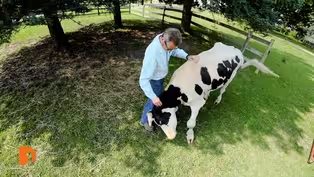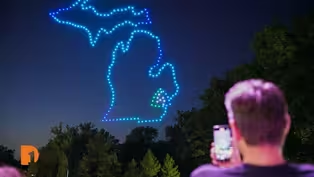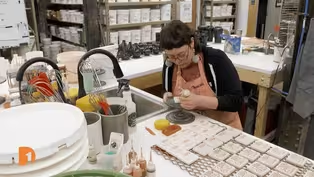
Southwest Detroiters discuss efforts to revitalize the area
Clip: Season 10 Episode 4 | 7m 54sVideo has Closed Captions
Two residents are helping revitalize Southwest Detroit with their construction company.
One Detroit’s Bill Kubota visits Southwest Detroit, an area known for its history and culture. It's also seeing a lot of redevelopment and new growth. Kubota talks with the founders of AGI Construction, a company in Southwest Detroit that’s working to bring new life to the area.
Problems playing video? | Closed Captioning Feedback
Problems playing video? | Closed Captioning Feedback
One Detroit is a local public television program presented by Detroit PBS

Southwest Detroiters discuss efforts to revitalize the area
Clip: Season 10 Episode 4 | 7m 54sVideo has Closed Captions
One Detroit’s Bill Kubota visits Southwest Detroit, an area known for its history and culture. It's also seeing a lot of redevelopment and new growth. Kubota talks with the founders of AGI Construction, a company in Southwest Detroit that’s working to bring new life to the area.
Problems playing video? | Closed Captioning Feedback
How to Watch One Detroit
One Detroit is available to stream on pbs.org and the free PBS App, available on iPhone, Apple TV, Android TV, Android smartphones, Amazon Fire TV, Amazon Fire Tablet, Roku, Samsung Smart TV, and Vizio.
Providing Support for PBS.org
Learn Moreabout PBS online sponsorship- Southwest Detroit is vibrant and always has been vibrant even in the downturn because people have a certain tenacity and a certain grit.
- [Bill] Southwest Detroit, like the construction boom town here, billions being spent.
The Gordie Howe International Bridge, Ford's Michigan Central, the Greenway Southwest, connecting to the Joe Louis.
That's the big stuff.
Plus, we forget those working the smaller projects.
- So AGI Construction is AGI.
It's All God Inspired.
- [Bill] AGI, that's Tanya Saldivar-Ali and Luis Ali, life and business partners, showing "One Detroit" one of their interior renovations at the Detroit Hispanic Development Corporation Building, a hub for the Latino community, where students learn about and build robots, get quality computer time, do some 3D printing.
- This is the first and the largest teen tech lab.
So we were super excited to be able to build out this space for our community.
- [Bill] Tanya and Luis started AGI in 2008.
The project that changed their lives?
A basement renovation at Cristo Rey High School.
- The basement was an old cafeteria from the 1940s and '50s, and they just used it for storage.
Our mentor, Frank Venegas, with the Ideal Group, really set that project aside for us and said, "Hey, guys, I've seen you, guys.
I know what you guys are capable of.
I have this project."
- [Bill] Frank Venegas, industrialist, supporter of the students at Cristo Rey.
- He was the guy.
- He's the guy.
- Yeah.
- Yeah, Frank Venegas is the godfather of Southwest Detroit.
- Yeah.
- He's the guy - [Bill] For AGI, a major undertaking.
Before the renovation, students ate lunch, sprawled across the gymnasium.
- And now they have this beautiful space and it really changed the trajectory of what type of projects that we decided to prioritize.
- [Bill] The projects they'd focus on, churches, schools, nonprofits, and small businesses like theirs here in Southwest, where their prospects didn't seem so bright, coming out of high school 30 years ago.
- Especially when the gangs came through in the '90s, I got into a lot of trouble.
You're a product of your environment.
And so my best friends that I grew up with from a very young age joined gangs.
I've considered myself a pretty good kid, but I had a little rap sheet.
- [Bill] Luis and Tanya first got together in high school.
Luis got out of town, joined the military, learning project management in his more than two decades in the Air Force.
Tanya got into business administration, finding her way, thanks to a Detroit Hispanic Development Corporation Anti-Gang Program.
Years later, the two out on their own, with their construction company.
- When we came back, obviously, we could have chose to move anywhere, but as the economy started to change from recession to everybody talking about the revitalization of Detroit and what's happening, we wanted to make sure we were part of that.
- [Bill] On Scotten Street, the relocated First Latin American Baptist Church.
- As a group of Mexican came to Detroit and were looking for a Baptist church that spoke Spanish, they were instrumental in starting our church in 1930.
- [Bill] A congregation displaced when the Gordie Howe Bridge Project needed their property down in the Delray neighborhood.
That left Pastor Kevin Casillas looking for a new home.
- We saw a long list of properties, many in Detroit and many outside of Detroit.
- We were looking at building a new building for them, and you know, the budget was getting up there.
- [Bill] Then another church closing down, gifted First Latin American their historic building.
- We're able to move into the building and with the settlement money, we're able to remodel the downstairs basement area and then construct a community gym that we call the Victory Activity Center.
- Run back, there's your man.
- [Bill] A gym like Pastor Cassillas had in Delray.
Youth basketball, indoor soccer, community events, weddings, baby showers.
- We understood that our value on that project was not just building something.
We were fighting for a church to be able to be made whole and still have an existing space here in the community.
They needed to be here.
- Come on, let's go, kids.
Let's go, let's go.
- Are you okay?
- One thing that we saw that was important to us as a church in the community that's been here for more than 90 years, was the heart that Luis and Tanya had to contract people from the community.
Not just Detroiters, but people that live here in Southwest Detroit.
- [Bill] On West Burner, another restaurant renovation and upgrade.
But these days, there's even more work to do.
- Up above, we have second story apartments.
- [Bill] Space is not viable as rentals for years.
Now, building owner see opportunity.
- So we've got housing stock above all the commercial corridors, and most of them need a lot of work.
- [Bill] One block over, new residential going up.
"Not an AGI project, but significant," Tanya says.
- So in my lifetime, this is the first time I've seen ground up development in our neighborhood.
It's exciting to see, but what we're doing is we're advocating for as many local contractors to be on these jobs.
It's important that we have representation from our communities working on these type of projects.
How does that development impact our neighborhoods?
Especially when we think about preserving neighborhood culture and history in the face of rapid development.
- [Bill] Tanya and Luis thought local contractors and tradespeople needed to get together to take part in all of this, have a place to meet.
- We have pretty much gutted everything down to the studs and have restructured the foundation of it.
- [Bill] In the heart of southwest Hubbard Richard Neighborhood, just north of the historic St. Anne's Church, AGI sets up shop.
Built 120 years ago, survivor of floods, a sinking foundation fixed now, the former residents of the Lozano family, and famed educator and musician, Frank Panchito Lozano, now to be called the Design-Build Green Hub.
- Because of some of the struggles and barriers that we've had as a construction company and wanting to help others kind of not have to go through some of those struggles.
We are in the middle of this development to be able to train kind of construction 101, and it's not just for skilled trades, but for entrepreneurs and other small businesses like ourselves.
- [Bill] A rehab with historic preservation in mind, even saving the chimney from collapse with the steel frame lending support, the building has green environmentally conscious features.
So this is a demonstration project, too.
- We were told that the house was used as a safe house, so when Mexicans would come from work, they would come here and get something to drink and eat, and then they would go and find work.
I was actually told that my father came through this house because he came in the late '50s, early '60s for road work.
♪ Lady - [Bill] September 2024, the Design-Build Green Hub, ready to go with an open house for the neighbors to see.
- Our next step is to start focusing on programming and what program is gonna look like around estimating and blueprint reading, and how can we engage more people in the development process.
- Our end goal is not for AGI to be this huge, you know, conglomerate making all this money.
Yeah, that's nice.
But the goal is to see our community come up.
And so we just want to engage people where they're at and make sure everybody has the opportunity to go to the next level.
- We are part of the fabric and the thread of Detroit, and our Southwest community has a rich legacy, but we want people to remember that contribution to the city as a whole as well.
Baobab Fare Co-Founder Hamissi Mamba shares his experience as a refugee coming to Detroit
Video has Closed Captions
Clip: S10 Ep4 | 1m 51s | Baobab Fare Co-Founder Hamissi Mamba participates in One Detroit’s “Destination Detroit” series. (1m 51s)
Michigan Barn Sanctuary gives second chance to farm animals
Video has Closed Captions
Clip: S10 Ep4 | 6m 2s | Barn Sanctuary, Michigan's only certified animal refuge, gives animals a second chance. (6m 2s)
One Detroit Weekend | Things to do around Detroit this weekend: July 25, 2025
Clip: S10 Ep4 | 1m 40s | Upcoming festivals, fairs and other fun events happening around Southeast Michigan this weekend. (1m 40s)
Pewabic Pottery: One of the nation’s oldest pottery and ceramics factories
Video has Closed Captions
Clip: S10 Ep4 | 6m 1s | One Detroit shares the history of Pewabic Pottery, one of the country’s oldest potteries. (6m 1s)
Providing Support for PBS.org
Learn Moreabout PBS online sponsorship
- News and Public Affairs

Top journalists deliver compelling original analysis of the hour's headlines.

- News and Public Affairs

FRONTLINE is investigative journalism that questions, explains and changes our world.












Support for PBS provided by:
One Detroit is a local public television program presented by Detroit PBS



